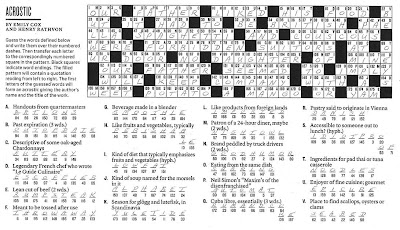Sunday, November 21, 2010
ACROSTIC, Puzzle by Emily Cox and Henry Rathvon, edited by Will Shortz
This Sunday’s pre-Thanksgiving food-stuffed acrostic feast draws a quotation from Les Menus Plaisirs, a short story from Michèle Roberts’ collection Playing Sardines. Food, however, is not the only thing on the menu.
Playing Sardines - a game in the dark, a game about desire, about wanting, all whipped up in a tale about the erotic allure of recipes: a cook whose obsessive love turns hungry and dangerous; a fan who tries to get into a celebrity novelist's sheets; a fanatical dieter and maker of lists working out how to deal with a husband who snores; a faddy eater thrown off-course by a miracle; a child greedy for love who faces up to her demon of jealousy - just some of the characters who shape this wonderful collection. Women yearning for what they haven't got - prepared to be wily, deceptive, cunning and perverse - all these strategies for survival in love and life are deployed here to mouth-watering effect. ~ Amazon.com
The quotation: OUR FATHER LIKED HIS FOOD BUT IT HAD TO BE BRITISH PAELLA SPAGHETTI AND COUSCOUS WERE FORBIDDEN SUITORS AT OUR DOOR NO DAUGHTER OF MINE OUR FATHER SEEMED TO IMPLY WILL KEEP COMPANY WITH A SWEET POTATO A MANGO OR YAM
The author’s name an the title of the work: ROBERTS PLAYING SARDINES
The defined words (all relating to food):
A. Handouts from quartermasters, RATIONS
B. Past expiration (3 wds.), OUT OF DATE
C. Descriptive of some oak-aged Chardonnays, BUTTERY
D. Legendary French chef who wrote “Le Guide Culinaire”, ESCOFFIER
E. Lean cut of beef (2 wds.), RUMP STEAK
F. Meant to be tossed after use, THROWAWAY
G. Beverage made in a blender, SMOOTHIE
H. Like fruits and vegetables, typically, PERISHABLE
I. Kind of diet that typically emphasizes fruits and vegetables (hyph.), LOW-FAT
J. Kind of soup named for the morsels in it, ALPHABET
K. Season for glogg and lutefisk, in Scandinavia, YULETIDE
L. Like products from foreign lands, IMPORTED
M. Patron of a 24-hour diner, maybe (2 wds.), NIGHT OWL
N. Brand peddled by truck drivers (2 wds.), GOOD HUMOR
O. Eating from the same dish, SHARING
P. Neil Simon’s “Maxim’s of the disenfranchised”, AUTOMAT
Q. Cubra libre, essentially (3 wds.), RUM AND COKE
R. Pastry said to originate in Vienna, DANISH
S. Accessible to someone out to lunch? (hyph.), IDIOT-PROOF
T. Ingredients for pad thai or tuna casserole, NOODLES
U. Enjoyer of fine cuisine, gourmet, EPICURE
V. Place to find scallops, oysters or clams, SEABED
In “Les Menus Plaisirs”, a short story from her recent collection Playing Sardines, Roberts even gives an example of what one could term “food racism”. The narrator’s father refused to eat anything but English food; suet pudding, Eccles cake, Bakewell tart, kippers, bitter marmalade, Cheddar cheese, toad-in-the-hole, bangers and mash, bacon sandwiches, and oxtail soup are all to his taste. Foreign food, however, has no chance. No courgettes, aubergines, garlic, or olive oil are allowed on his plate, and he is outraged when his daughter prepares a ratatouille for him: “None of your filthy foreign muck in my house”, he shouts before throwing the dish out of the window The narrator sums up, “food was treated like gentlemen callers in a Victorian novel: it was interrogated as to its intentions, its culture and origins. Paella, spaghetti and couscous were forbidden suitors at our door. No daughter of mine, our father seemed to imply, will keep company with a sweet potato, a mango, a yam. Making Sense: Sense Perception in the British Novel of the 1980s and 1990s by Ralf Hertel
————————
Click on image to enlarge.
Puzzle available on the internet at




No comments:
Post a Comment